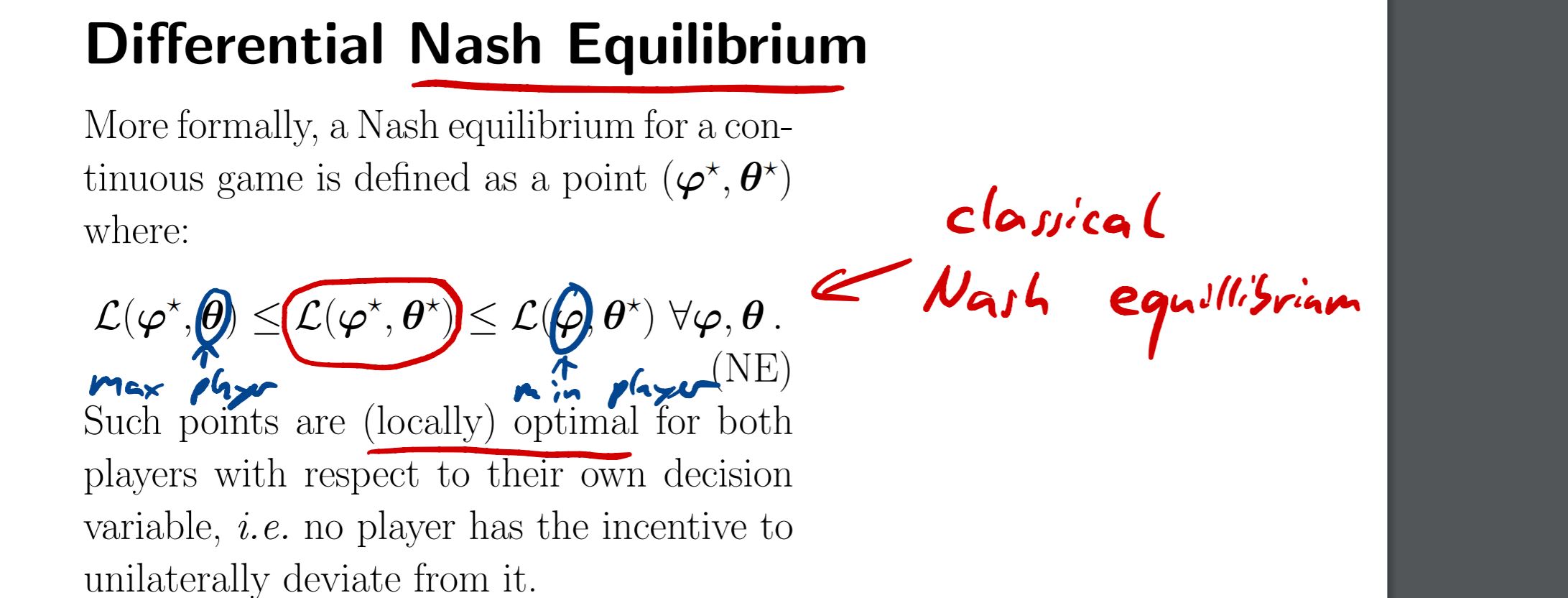I was looking at the GANS lecture for the NE definition and was wondering if it is local shouldn't the general condition be followed by " for all theta and phi within a certain neighborhood"? instead of for all theta and phi?
Also since the optimum seems to happen when D(x)=1/2 why are we even bothering optimizing it in the algorithm when we can just fix D as a random number generator with equal probability between 1 and 0 since D* seems to be independent of x?
Thanks!
I guess D(x)=1/2 only makes sense when you are at the NE, since then adversary G has learned the distribution of data, i.e. p_g = p_d, so the best thing for D to do is make a random unbiased guess. The way I think about it is that D is only there to help G learn, and at the end of training you will obtain a model that can generate realistic images of cats for example.
That's just my intuition, not sure if it's correct.
for the first part, yes, if the point is local NE, the condition should hold only in a neighborhood of that point.
Regarding your second question.
D is not independent of x, but rather once at the optimum, it will output 1/2 for any input sampled from p_d and p_g -- only when the modeled distribution is the same as the real. In other words, if your generative model is well-trained you get output 1/2, and getting an output of 1/2 doesn't imply that your model is well trained (it's an implication, not equivalence).
(What the second print screen is saying is that if we go back to the expression for D^* and replace p_g=p_d we obtain the output is 1/2, and not that the output of D does not depend on x)
Hi, this may be a silly question but why do we maximize the integrand when solving for the optimal D instead of the entire integral itself? Would these two formulations be equivalent? Thanks in advance :)
GAN NE and algorithm
Hi,
I was looking at the GANS lecture for the NE definition and was wondering if it is local shouldn't the general condition be followed by " for all theta and phi within a certain neighborhood"? instead of for all theta and phi?

Also since the optimum seems to happen when D(x)=1/2 why are we even bothering optimizing it in the algorithm when we can just fix D as a random number generator with equal probability between 1 and 0 since D* seems to be independent of x?

Thanks!
I guess D(x)=1/2 only makes sense when you are at the NE, since then adversary G has learned the distribution of data, i.e. p_g = p_d, so the best thing for D to do is make a random unbiased guess. The way I think about it is that D is only there to help G learn, and at the end of training you will obtain a model that can generate realistic images of cats for example.
That's just my intuition, not sure if it's correct.
1
Hi,
for the first part, yes, if the point is local NE, the condition should hold only in a neighborhood of that point.
Regarding your second question.
D is not independent of x, but rather once at the optimum, it will output 1/2 for any input sampled from p_d and p_g -- only when the modeled distribution is the same as the real. In other words, if your generative model is well-trained you get output 1/2, and getting an output of 1/2 doesn't imply that your model is well trained (it's an implication, not equivalence).
(What the second print screen is saying is that if we go back to the expression for D^* and replace p_g=p_d we obtain the output is 1/2, and not that the output of D does not depend on x)
Hi, this may be a silly question but why do we maximize the integrand when solving for the optimal D instead of the entire integral itself? Would these two formulations be equivalent? Thanks in advance :)
Add comment